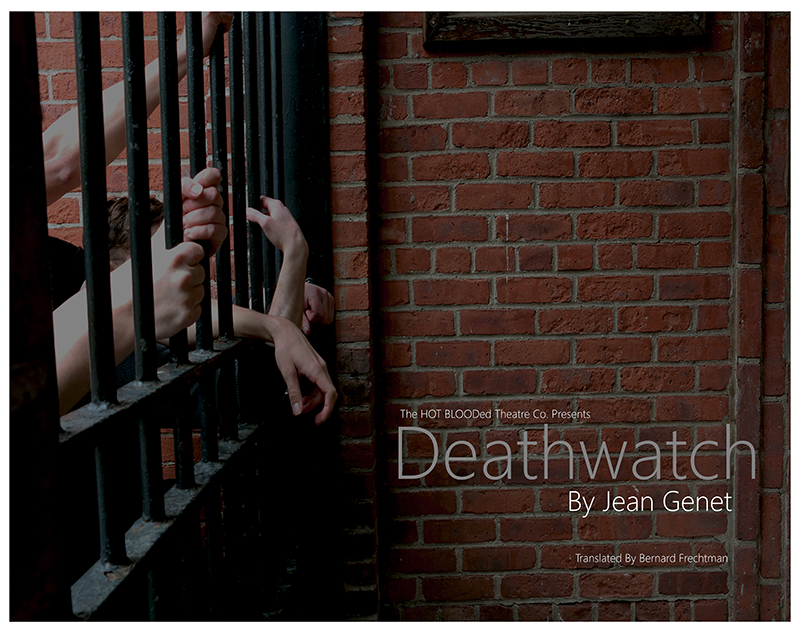
Seminal existentialist writer and activist Jean Genet's 1949 play Deathwatch (his first) is intimate in its scale, consisting almost entirely of three men in one room, so it is appropriate that HOT BLOODed Theatre Co. has located their current production in a very intimate space on Manhattan's Upper West Side. The result of an actor-centered process that forgoes a director, this production, their first in NYC, is a lithe, lean hour of theater that bodes well for future productions and successfully implicates the audience in its own voyeurism.
The single room in Deathwatch is a prison cell, within which are confined George Lefranc (Max Kantor), Georgie to his cellmates, and the young Maurice (Beatriz Cavalieri), both imprisoned for lesser crimes, along with the murderer Green-Eyes (Daniel Csutkai), who is awaiting execution. As spectators, we watch them bicker and boast until one prisoner, ignoring Green-Eyes' maxim that true misfortune cannot be deliberately assumed, brings further tragedy upon the men. Throughout the play, the three compete in constructing selves through and in addition to their reputations, with the ostensible initial source of their conflict being the heart and body of Green-Eyes' girl. They jockey for position in a hierarchy based in part on the severity of their misdeeds, with Maurice and Georgie seeking status and approval from Green-Eyes. This competition positions Green-Eyes as something approaching a father figure, but also at times as something like a lover (making his girl on the outside a sort of proxy for his own affections). The cell and its dynamics function as a microcosm of the prison as a whole, as suggested by discussions of Snowball, another top dog/aspirational figure within the prison ecosystem. There are of course various ways in which the prison as a whole might be interpreted as itself a microcosm of the larger society within which it exists.
One of the ways that the current production highlights the connections among these various symbolic levels is through its use of space. The set is made up of a single six foot by ten foot frame delineating the cell in three dimensions. There is no seating (though some can be provided for patrons who need it), and the audience members are free to arrange themselves however they wish around the cell. The effect of one small space within another could be read as a cell within a cell, but the immediacy that this arrangement creates also underscores the voyeurism in which the audience is partaking, and which, given the subject matter, might put one in mind of the practice at Bedlam Hospital of allowing, until 1770, the paying public to roam its halls and observe its "lunatics" (or, on a more modern note, the ways in which we convert an unequal justice system into entertainment by repackaging it for reality television products). The Deathwatch audience is also encouraged to move around the space at will during the performance, and the fact that no one took advantage of this at the performance that we attended says some interesting things about how we police ourselves, especially within public space. (Don't we desire the approval of others who share our space in the same way that Maurice and Georgie desire it of Green-Eyes, even if those others are otherwise strangers?) A corrupt prison guard (Sven Haabeth) unites the spaces of the audience and prisoners as the only one free to cross the boundary of the cell. Given this spatial arrangement, it is an almost shocking moment when Green-Eyes once breaks that boundary, demonstrating his power and position, though that power is still presumably circumscribed by the guard's control over movement within the prison.
The performances by all three actors make it easy to believe that they have been shut up together for a long time as they negotiate ideas of boundaries and personal space when there is none to be had. The production gets off to a running start and never really slows down, and the actors maintain both that intensity and an organic feeling to the events and emotional interplay throughout, while the guard, aloof from the details of what is going on in the cell, is suitably intimidating. Daniel Csutkai described to us his ideal theater as challenging and discomfiting, and beyond the uneasiness that the continued relevance that elements like the play's portrayals of lying for and about power should inspire, this production achieves that ideal in its compelling staging and, pardon the pun, execution. - Leah Richards & John Ziegler
